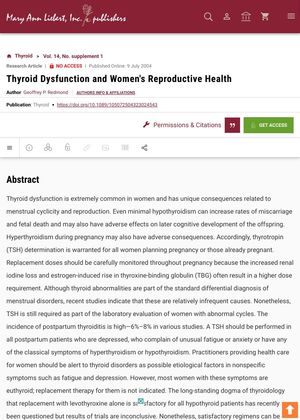Thyroid Dysfunction and Women's Reproductive Health
April 2004
in “
Thyroid
”

TLDR Thyroid problems can negatively affect women's reproductive health and pregnancy, and can cause symptoms like fatigue and depression, but not all women with these symptoms need treatment.
The 2004 study "Thyroid Dysfunction and Women's Reproductive Health" found that thyroid dysfunction, particularly hypothyroidism, can significantly impact women's reproductive health, including increasing rates of miscarriage, fetal death, and potentially affecting the cognitive development of offspring. Hyperthyroidism during pregnancy was also found to have potential adverse effects. The study recommended that all women planning pregnancy or already pregnant should have their thyrotropin (TSH) levels checked. The study also noted that while thyroid abnormalities are considered when diagnosing menstrual disorders, they are relatively infrequent causes. Postpartum thyroiditis was found to have a high incidence rate of 6%-8%. The study concluded that healthcare providers should be aware of thyroid disorders as potential causes of nonspecific symptoms such as fatigue and depression in women. However, most women with these symptoms were found to be euthyroid, meaning they have normal thyroid function, and therefore do not require replacement therapy. The study also questioned the long-standing practice of treating all hypothyroid patients with levothyroxine alone, though trial results were inconclusive.
